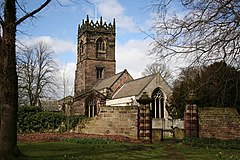|
Aston, South Yorkshire
Aston is a residential village in the Metropolitan Borough of Rotherham, South Yorkshire, England. The village falls within the Holderness ward of the borough.[1] Aston is approximately 2 miles (3 km) from Rother Valley Country Park. HistoryAston was traditionally a farming village and some old farm buildings still line the main road. In the early 20th century the population increased because of the opening of coal mines in the area. It joined local villages Aughton and Swallownest, to form the Aston cum Aughton civil parish. EtymologyUnlike other places of the same name, Aston does not mean "eastern farm or village," but instead originates from the Old English words tun "farm, village, and estate" with an uncertain first element. The name was recorded as Essetone (which was first documented in the Domesday Book) in 1039, suggesting Old English ǣsc "ash tree" (as in Ashton and Ashton-in-Makerfield), although this is not certain.[citation needed] LandmarksAston HallAt the eastern end of the village is Grade II* listed Aston Hall which was a large country house, afterwards a hospital, and at one time known as Aughton Court before becoming a hotel and restaurant.[2] It gives its name to Aston Hall Cricket Club, which plays home games close to the Hall. A nearby street named "The Chase" suggests[to whom?] that the surrounding housing estate now occupies land that formed the traditional hunting grounds attached to the hall.[citation needed] Church of All SaintsAdjacent to Aston Hall is the oldest surviving structure in the village, the Grade I listed Church of All Saints. It is built on the site of earlier church listed in the Domesday Book, and parts of it date to 12th, 14th and 15th centuries though with restoration works including rebuilding of the chancel in the 19th century. Monuments in the church include two wall plaques to William Mason a former rector of the church.[3][4] The old rectory building on Church Lane was also worked on by John Carr, it is named High Trees and is Grade II listed[5] as are a number of other 18th and early 19th century buildings along the main road (Worksop Road) including The Grange and South Farm.[6][7] To the north of these on Aughton Lane is the William Layne Reading Room, a building that was formally Aston Old School, founded in 1738, next to which stands a war memorial erected in 2011.[8][9] EducationAston Academy is the local high school, specialising in mathematics and computing. Most pupils come from the Aston-cum-Aughton area, with others from nearby villages such as Beighton, Woodhouse and Treeton. Local primary schools are:
See alsoReferences
External links
|
||||||||||||||||||||||||||||||||||||||||||

